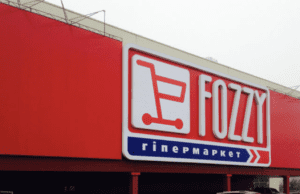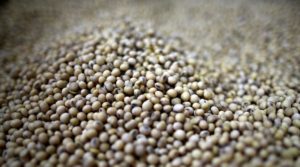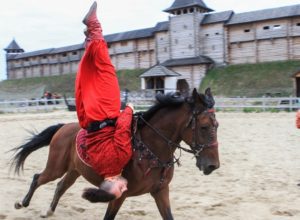
Fozzy Group in 2018 increased goods turnover at its food chains Fora, Silpo, Thrash!, Fozzy Cash & Carry by 26% compared to 2017, to UAH 78.8 billion, the press service of the company has reported.
“In 2018, goods turnover at the retail grocery chains of the group amounted to UAH 78.8 billion, which is 26% more than in 2017. Thus, Fozzy Group continued its development in 2018: this brought UAH 2.9 billion in taxes to the national budget. In particular, Silpo-Food LLC is among the top three largest taxpayers in Ukraine among retailers in 2018, according to the State Fiscal Service,” the report said.
According to the report, in 2018 some 25 new stores were opened, in particular, seven Silpo in five cities of Ukraine, 12 Fora stores and six Thrash! discount stores. The total number of Fozzy Group stores at the beginning of 2019 was 686.
The group also opened two new restaurant projects in 2018: the Cuban restaurant and bar Escobar and an establishment with the aesthetics of the world bars Who & Why Drinkery. The innovative postal and logistics operator Justin also was launched, its 500 branches are already located in the stores of Fozzy Group.

Ukraine has started sowing soybeans, planting 31,000 hectares (2% of the forecast) with this crop, the press service of the Ministry of Agrarian Policy and Food has reported.
According to the ministry, as of April 17 some 1.5 million hectares are sown with barley (94%), 150,000 hectares with wheat (90%), 165,000 hectares with oats (84%), and 283,000 hectares with peas (83%).
Ukraine has also sowed 264,000 hectares with corn (6%), 194,000 hectares with sugar beets (79%), and one million hectares with sunflower (18%).
In addition, according to the ministry, agrarians fertilized winter crops on 7.5 million hectares (99% of the forecast).

Imports of tractors to Ukraine last year increased almost fivefold compared to 2017, to 113,200 units, of which 2,200 are used machinery, the Ukrainian Agribusiness Club (UAC) has said.
According to the association, in monetary terms, tractors were imported for $431 million, which is 12.6% less than in 2017.
“In quantitative terms, the total import of tractors grew in 2015-2016 and in 2018, while in 2017 there was a significant subsidence. Most of this equipment was imported last year,” the association noted.
According to the UAC, if in quantitative terms imports of tractors were growing from year to year, then in value terms it reached its peak value in 2017, and in 2018 the figure was falling.
“With regard to used tractors, in general, in the four years under consideration, their share in the total number of imported machinery was about 4%. This is significantly less compared to harvesters, where this segment occupied half of all deliveries from abroad,” the association noted.

Belgium’s Upgrade Energy is finishing construction of a first phase of a solar power plant with a capacity of 5.9 MW in Korosten district of Zhytomyr region, installing 18,000 PV modules, the press service of the Zhytomyr Regional Administration has reported, referring to acting Director of the agricultural and industrial development and economic policy of the regional administration Viktor Hradivsky.
The total capacity of Irshansk solar power plant will be 25-30 MW.
In 2018, the Zhytomyr Regional Administration signed 14 memorandums with investors in solar power plants. In particular, Altostrata Energy Limited (Ireland) proposed a 65 MW solar power plant project in Luhyny district. In April, Altostrata Energy signed an agreement on connecting the plant to the power grid, and at the end of the month the company intends to start construction.
In the summer of 2019, a 10 MW plant is also expected to be launched in the village of Chopovychi, Malyn district, by the GESS group of companies (the United States).
In March, public hearings were held on the establishment of a feed-in tariff for a 20 MW solar power plant on the territory of the Khoroshiv merged territorial community, which Global Ecopower SA (France) intends to build.
As reported, Modus Energy International B.V. LLC (Lithuania) plans to build a 35 MW solar power plant on the territory of Lubar merged community. In February 2019, the company received a declaration for construction, as well as technical conditions for connection from national energy company Ukrenergo.
Eney International LLC is preparing land utilization documentation for the construction of a 55 MW solar power plant in the Brusyliv district.
A subsidiary of Naftogaz-Energoservice is developing a construction project for a 30 MW solar power plant on the territory of the Dubysche village council of Chudniv district.
Currently, one industrial 15 MW Hanska solar power plant (the investor is Better Energy Energo, Denmark) is operating in Zhytomyr region, which was launched at the end of last year.

On April, 20 and 21 the festival of horse-trick art «Centaurs» will take place in the «Kyivan Rus Park». In the program: the performances of the best horseback stuntmen of Ukraine with amazing tricks, horse trick riding competitions, demonstrative performances. And also the Ancient Kyiv theatre performances, interactive ancient Slavic amusements, horse riding, master-classes, dance flash mobs, museums and expositions, extreme attractions. In the evening – a bright fiery program with the shooting of fire balls from the Trebuchet, on Saturday, April, 20 – a fire show. And all of these in a real, live, medieval city.
Ancient Kyiv opens at 10:00. The program starts at 13:30.
The ticket price: a full adult ticket – 250 UAH, for pensioners and students – 150 UAH, for schoolchildren – 60 UAH, for preschool children – for free.
Ancient Kyiv in the «Kyivan Rus Park» is located in Kyiv region, Obukhiv district, the vill. Kopachiv.
Route taxis leave from Kyiv from the «Vydybitchi» metro station.
Details on the website www.parkkyivrus.com
The Interfax subscribers can save money with the “openbusiness-20” promo code for a 20%-discount for a full price adult ticket to the Principality of Kyivan Rus:
– by previous order by tel.: +38 044 461-99-37, +38 050 385-20-35
– or at the cash desk at the entrance to the «Kyivan Rus Park».

About half of Ukrainians are counting on an improvement in the situation in the country after the presidential election and believe that the new team of the head of state should be given at least a year to achieve positive results. According to results of a survey conducted by the Sociological Group Rating during the past two weeks of April, 48% of respondents expect an improvement in the situation in the country as a result of presidential elections. Some 25% have no hopes for changes, another 10% expect deterioration. Residents in Ukraine’s southern and eastern regions are the most optimistic, along with younger respondents and supporters of showman and presidential candidate Volodymyr Zelensky.
Half of respondents believe the new president’s team should be given at least a year to show positive results. Despite this, a quarter of respondents want their achievements to appear within six months, another 14% want to see them in three months and 8% are waiting for immediate changes. Among the young respondents, residents of southern and central Ukraine are slightly more than those who are willing to wait a year or more to see the achievements of the work of the future head of state.
Some 28% of respondents are convinced that this election rather united the country. At the same time, 24% believe that the split has intensified. A third of respondents say this presidential election neither split nor united Ukraine. Most of those who see consolidating processes are among Zelensky supporters (38%). Every fifth respondent sees the possibility of a split. But among Poroshenko supporters, one in three predicts division, compared to 17% who predict the country will unite.
Some 76% of respondents say this is normal when their family members, relatives or acquaintances support a different candidate. Despite this, 9% consider this situation to be a mistake, while noting that they will not try to influence the choice. An equal number say they will try to convince their loved ones to change their minds, mostly among Poroshenko’s supporters – 22%.
Sociological Group Rating conducted a survey of electoral attitudes of Ukrainians from April 12 to April 16, 2019 among Ukrainians who are 18 and older. The sample is representative by age, gender, region, and type of settlement. Some 3,000 persons took part via personal formal interview (face-to-face). The margin of error of the survey does not exceed 1.8%.